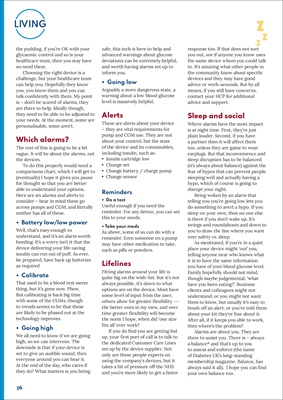
36
LIVING
you don't need them. The proof is in
the pudding, if you're OK with your
glycaemic control and so is your
healthcare team, then you may have
no need them.
Choosing the right device is a
challenge, but your healthcare team
can help you. Hopefully they know
you, you know them and you can
talk confidently with them. My point
is - don't be scared of alarms, they
are there to help. Ideally though,
they need to be able to be adjusted to
your needs. At the moment, some are
personalisable, some aren't.
Which alarms?
The rest of this is going to be a bit
vague. It will be about the alarms, not
the devices.
To do this properly would need a
comparisons chart, which I will get to
(eventually) I hope it gives you pause
for thought so that you are better
able to understand your options.
Here are six alarms and alerts to
consider - bear in mind these go
across pumps and CGM, and literally
neither has all of these.
• Battery low/low power
Well, that's easy enough to
understand, and it's an alarm worth
heeding. It's a worry isn't it that the
device delivering your live-saving
insulin can run out of puff. As ever,
be prepared, have back up batteries
as required
• Calibrate
That used to be a blood test meter
thing, but it's gone now. Phew.
But calibrating is back big time
with some of the CGMs, though
to trends seems to be that these
are likely to be phased out at the
technology improves.
• Going high
We all need to know if we are going
high, so we can intervene. The
downside is that if your device is
set to give an audible sound, then
everyone around you can hear it.
At the end of the day, who cares if
they do? What matters is you being
safe; this tech is here to help and
advanced warnings about glucose
deviations can be extremely helpful,
and worth having alarms set up to
inform you.
• Going low
Arguably a more dangerous state, a
warning about a low blood glucose
level is massively helpful.
Alerts
These are alerts about your device
- they are vital requirements for
pump and CGM use. They are not
about your control, but the state
of the device and its consumables,
including insulin, such as:
• Insulin cartridge low
• Change set
• Change battery / charge pump
• Change sensor
Reminders
• Do a test
Useful enough if you need the
reminder. For any device, you can set
this to your needs.
• Take your meds
As above, some of us can do with a
reminder. Even someone on a pump
may have other medication to take,
such as pills or powders.
Lifelines
Fitting alarms around your life is
quite big on the wish-list. But it's not
always possible, it's down to what
options are on the device. Most have
some level of input from the user,
others allow for greater flexibility -¬
the better ones in my view, and over
time greater flexibility will become
the norm I hope, when did 'one size
fits all' ever work?
If you do find you are getting fed
up, your first port of call is to talk to
the dedicated Customer Care Lines
set up by the device supplier. Not
only are these people experts on
using the company's devices, but it
takes a bit of pressure off the NHS
and you're more likely to get a faster
response too. If that does not sort
you out, see if anyone you know uses
the same device whom you could talk
to. It's amazing what other people in
the community know about specific
devices and they may have good
advice or work-arounds. But by all
means, if you still have concerns,
by all means contact your HCP for
additional advice and support.
Sleep and social
Where alarms have the most impact
is at night time. First, they're just
plain louder. Second, if you have
a partner then it will affect them
too, unless they are game to wear
earplugs. But that inconvenience and
sleep disruption has to be balanced
(it's always about balance) against the
fear of hypos that can prevent people
sleeping well and actually having a
hypo, which of course is going to
disrupt your night.
Being woken by an alarm that
telling you you're going low lets you
do something to avert a hypo. If you
sleep on your own, then no one else
is there if you don't wake up. It's
swings and roundabouts and down to
you to draw the line where you want
over safety vs. sleep.
As mentioned, if you're in a quite
place your device might 'out' you,
telling anyone near who knows what
it is to have the same information
you have of your blood glucose level.
Family hopefully should not mind,
though maybe judgemental, 'what
have you been eating?'. Business
clients and colleagues might not
understand, or you might not want
them to know, but usually it's easy to
brush off an alert, or you've told them
about your kit they're fine about it.
Afterall, if it keeps you able to work,
then where's the problem?
Alarms are about you. They are
there to assist you. There is - always
a balance* and that's up to you
to assess and enforce (the name
of Diabetes UK's long-standing
membership magazine, Balance, has
always said it all).